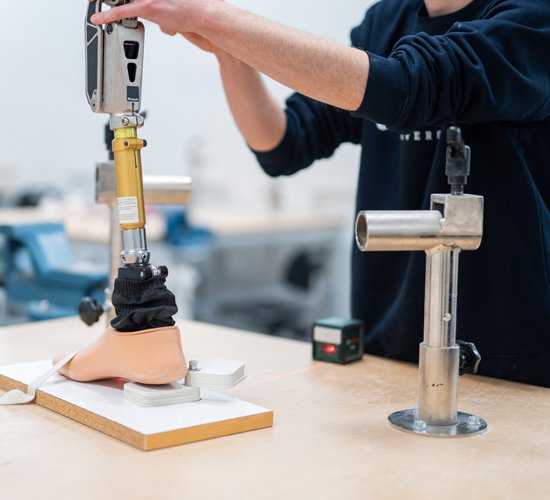Welcome To Our Clinic !
Orthotic and Prosthetic (O&P) Engineering is a specialized field within biomedical engineering focused on the design, development, and fitting of orthotic devices (orthoses) and prosthetic limbs (prostheses). These devices are intended to support individuals with physical impairments, whether due to congenital conditions, disease, or injury, enabling them to achieve greater mobility, functionality, and independence.
Orthotic devices are used to support or correct the function of a limb or the torso. They include a wide range of apparatuses such as braces, splints, and shoe inserts designed to stabilize or immobilize parts of the body, provide support to weak or injured limbs, and correct or accommodate deformities. Prosthetic devices, on the other hand, are artificial limbs designed to replace a missing body part. These can range from simple cosmetic limbs to highly complex and functional artificial limbs equipped with advanced technology such as microprocessors and sensors that mimic natural movement.

O&P engineering integrates principles from various disciplines including
biomechanics, materials science, and robotics. The process typically begins with
a thorough assessment of the patient’s needs, involving detailed measurements
and often advanced imaging techniques.
Engineers and clinicians
collaborate to
design devices tailored to the individual’s anatomy and requirements. The use of
computer-aided design (CAD) and computer-aided manufacturing (CAM) technologies
is prevalent in this field, allowing for precise customization and improved
fitting of orthotic and prosthetic devices.
Innovation is a cornerstone of O&P engineering. Recent advancements include the development of myoelectric prostheses, which use electrical signals from the user’s muscles to control the prosthetic limb, and the incorporation of lightweight, durable materials such as carbon fiber. Additionally, research is ongoing into the integration of neural interfaces, which could allow prosthetic devices to be controlled directly by the brain, providing even more natural and intuitive use.


The impact of orthotic and prosthetic engineering on individuals’ lives is profound. By restoring mobility and function, these devices not only enhance physical capabilities but also improve psychological well-being and quality of life. As technology continues to advance, the future of O&P engineering promises even more sophisticated and effective solutions, offering hope and empowerment to those with physical disabilities.